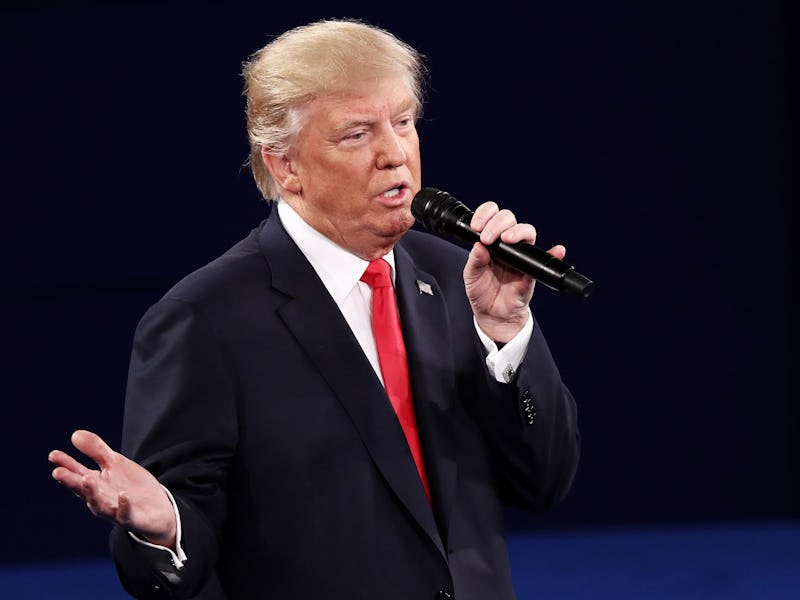Here's Why Donald Trump Supports Bad Ideas Like "Clean Coal"
It's all about identity.

Donald Trump has given the thumbs up to clean coal, a controversial energy technology that aims to minimize the environmental impact of traditional coal fuel. On the outside, it sounds bizarre. Why support a questionable technology when your opponent is proposing a full-blown transition to renewables? Despite mass rejection by his own party, Trump is working against a wealth of empirical evidence that shows “clean coal” — processing coal and taking measures to lessen carbon dioxide emissions — doesn’t do enough.
“I’m all for alternative forms, including wind, including solar, etc., but we need much more,” Trump said at the second presidential debate on Sunday night at Washington University in St. Louis. “There is a thing called clean coal. Coal will last 1,000 years in this country.”
Clinton, on the other hand, took a more pro-renewables stance, while acknowledging the need for a response to coal miners left behind by economic changes. “I support moving toward more clean, renewable energy as quickly as we can, as I think we can be the 21st-century clean energy superpower,” she said.
Clean coal is not renewable energy, but it aims to alleviate coal’s environmental impact by capturing CO2 before it reaches the atmosphere. Carbon capture and storage is in its infancy, but is hailed as a way of avoiding major upheaval to energy infrastructure and working towards emissions targets.
The evidence is lacking, but that doesn’t matter too much. Supporting clean coal is about setting up social markers, and Trump’s reluctance to grant full-throated support to renewables has a long history in the conservative movement. Jonah Berger, a professor at the Wharton School at the University of Pennsylvania that has written about voting as a social act, has cited renewables as an example of an issue polarized by Republican leaders during the 2000 election. Politicians painted Al Gore’s support for clean energy as partisan nonsense, and as a partisan candidate in general, his defining ideas were deemed rubbish by conservatives. It didn’t matter whether the ideas were good or bad, they were tainted by association.
Clean coal is a tantalizing prospect: a 2011 report from the U.S. Energy Information Administration found coal accounted for 71 percent of the country’s electric carbon emissions in 2015. Unfortunately, it’s had little real world success. The Obama administration hailed the Kemper coal plant in Mississippi as its flagship clean coal project, but the New York Times found in July that the plant was taking two years longer than expected to build and more than $4 billion over budget. The Associated Press reported that Norway dropped a carbon capture project due to spiraling costs, and during the 2015 Paris climate talks, just eight countries out of 170 pointed to clean coal technologies as a way of cutting emissions.
But for Trump, clean coal is a way of building up these identifiers that Berger outlined. It’s even referenced by Trump during his answer: coal mining communities have been left behind, and a vote for me is a vote to express your identity. The evidence is not in Trump’s favor, and a Trump administration may not even pursue the idea, but the message is clear.